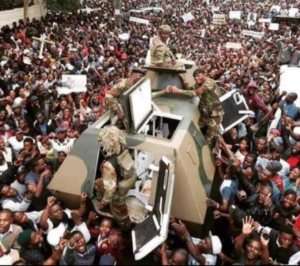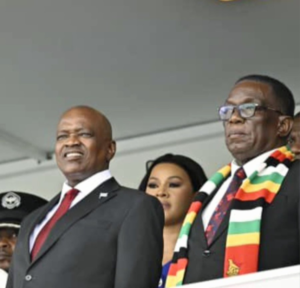PRESIDENT MNANGAGWA’S LOYALISTS PUSH FOR A THIRD TERM DESPITE CONSTITUTIONAL BARRIERS

Despite Zimbabwean President Emmerson Mnangagwa’s public assertions against extending his presidency beyond his current second term, which is slated to end in 2028, his most ardent political supporters continue to openly advocate for his continued leadership. This revelation raises concerns about the possible bending or outright breaking of constitutional limits that restrict a president to serving only two terms.
At the center of this controversial campaign is Owen “Mudha” Ncube, a key political figure in Mnangagwa’s home Midlands province and the current Midlands Provincial Affairs and Devolution Minister of State. During a recent gathering in Shurugwi, Ncube was seen leading chants proclaiming that Mnangagwa would remain in power until at least 2030, well beyond the expiration of his second term. This event underscores a significant push from within Mnangagwa’s circle to extend his rule, directly contradicting the nation’s constitution.
Interestingly, the rally also featured Mnangagwa’s twin son, Collins Takunda, who joined in the slogan shouting alongside Ncube. Collins, brother to Sean Tafadzwa, represents another layer of familial involvement that could be seen as consolidating Mnangagwa’s hold on power through both family and political loyalists.
The push for Mnangagwa’s extended presidency is not without opposition within his own party. Vice-President Constantino Chiwenga, backed by a military-supported faction within the ruling Zanu PF party, is staunchly opposed to any attempts to keep Mnangagwa in power beyond his legally mandated term limits. Chiwenga and his faction have been vocal about their stance that Mnangagwa should not only adhere to the constitutional provisions but should also consider stepping down at or even before his term officially ends in 2028.
This internal party conflict is emblematic of broader tensions within Zimbabwean politics, where personal ambitions and constitutional governance are often at odds. The debate over Mnangagwa’s potential third term is particularly significant, as it tests the strength and resilience of Zimbabwe’s democratic institutions post-Robert Mugabe’s era, who himself was notorious for manipulating constitutional mandates to maintain his lengthy rule.
Legal experts and political analysts are closely watching these developments, as any move to alter the constitution could set a dangerous precedent for future governance in Zimbabwe. Such a scenario could undermine the democratic gains made in recent years and plunge the country back into the kind of political instability and turmoil that marked the latter years of Mugabe’s rule.
The international community is also keeping a keen eye on these unfolding events. Western countries and international human rights organizations, which have a fraught history with Zimbabwe due to past electoral malpractices and human rights abuses, might view any constitutional amendments as a step backward in the country’s political reform process. This could potentially lead to renewed sanctions and further isolation, which Zimbabwe can ill afford given its ongoing economic struggles.
Moreover, the Zimbabwean populace, who are increasingly vocal about their rights and the need for accountable governance, may also play a crucial role in this political saga. Their reaction to Mnangagwa’s potential term extension could influence the political landscape significantly, potentially sparking widespread calls for democratic adherence and constitutional respect.
As Zimbabwe approaches the 2028 electoral threshold, the actions of Mnangagwa and his supporters, as well as the resistance from within their own ranks, will be critical in shaping the country’s future. Whether Zimbabwe can maintain its course toward a more stable and democratic governance structure or revert to its past patterns of leadership manipulation remains to be seen. The coming years will be a true test of the nation’s commitment to democracy and the rule of law.



